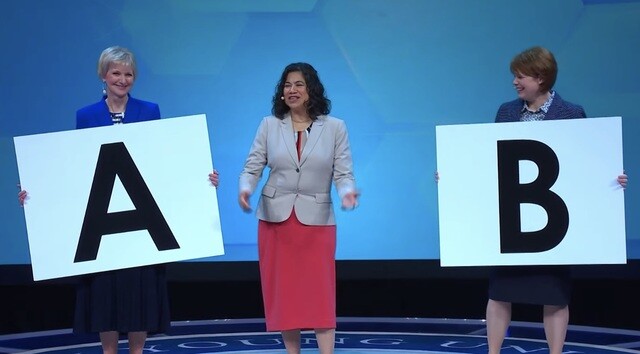If you missed the opening session of BYU Women’s Conference, we are here to help. See talk summaries of the messages below. You can also watch the entire first day of the conference here.
BYU Women’s Conference kicked off on Thursday morning with an exercise: the Relief Society General Presidency led those watching both online and in Brigham Young University’s Marriott Center in practicing “the best response” when seeing the challenges of those around us.
Sister Reyna Isabel Aburto presented a variety of situations and gave two options for how to respond, asking the audience to choose between them. For example:
“You see a young adult couple you know who are out on a date.”
Option A response: “It’s great to see you two. How are school and work going?”
Option B response: “Hey, do I hear wedding bells in the distance?”
The answer to this one (Option A) may seem fairly obvious, but as the exercise went on the choices became trickier.
“At Church, you see a couple who [has] been married for some time and they do not have children.”
Option A response: “Why don’t you have kids? When will you have kids? You’re not getting any younger.”
Option B response: “Enjoy this time not having any kids. You want one of mine?”
“Well actually, this is a trick question. Both are awkward and insensitive,” Sister Aburto said.
Emphasizing the need for belonging, President Jean B. Bingham added, “Our responsibility is to extend an open hand and heart. As we do that, we find that we have created a safe place for sharing, a safe place to grow, a safe place to become our best selves.”
“Liv”
Sister Sharon Eubank then introduced the audience to her friend, Jessica Livier “Liv” Haynes, who, describing herself said, “I’m a Young Women’s president. I’m a daughter, a sister, a returned missionary. I am queer. I am a person who loves going to the temple. And above all of those things, I am a daughter of Heavenly Parents who strives every day to be a disciple of Jesus Christ.”
Haynes explained that she did at one point leave the Church, but that she has come to find a place to belong. She shared the example of one bishop who made her feel welcomed.
“I had a bishop who, when I had my first interview with him and told him about my identity, he told me, ‘I do not know anything about this. But I’m willing to learn. What can I read? What can I do better to help people know that this is a safe space?’” Haynes recalled.
Haynes then bore a powerful testimony.
“For a long time, I felt that recognizing who I am made me broken and I was ashamed of saying it out loud. I had always had those feelings, but it took me about 20 years to look at myself in the mirror and say it out loud. But now I know that I’m not broken. I am perfect the way I am. I am loved by my Heavenly Father. I know I’ll see Him and I’ll see Jesus Christ one day, and the wholeness that I feel now is going to be even greater and bigger than anything I can experience,” she said.
New Primary General Presidency’s Call to Serve
Those watching were introduced for the first time to the new Primary General Presidency who spoke of the miracles surrounding their call to serve.
President Camille N. Johnson said of her newly called counselors, “I did not know Susan or Amy, but both of their names came to me quickly.” She knew of Sister Susan H. Porter’s hope following her husband’s passing from an episode of the Latter-day Saint Women podcast. And she knew that Sister Amy A. Wright had courageously battled cancer. Both women were serving on general advisory councils but she knew very little else about them.
► You may also like: The Primary General Presidency was released. Here are just 7 changes that impacted children during their service
Sister Wright recalled the car ride she shared with her husband as they drove to meet with Elder Quentin L. Cook. Together, they listened to President Russell M. Nelson’s talk, “Let God Prevail.” About halfway through the talk, she had a very clear impression that she would be called to serve as the Second Counselor in the Primary General Presidency.
“Before I could even begin to process this information, almost immediately came a very distinct pattern of uninvited thoughts that flooded my mind: ‘You are not enough. You are not good enough. You are not smart enough. You are not talented enough. You are not worthy enough.’ Every single ‘not enough’ that you could possibly imagine. I closed my eyes and silently prayed that my mind would be clear and that my heart would feel peace.
“I think that it would be fair to assume that the confirmation I was seeking would come in the form of validations such as, ‘You are enough. You are good enough. You are talented enough. You are going to do great.’ Instead, I was a little taken aback to discover that the impression that came to my mind was this: ‘You are right. You are not enough, and you will never be your definition of enough, but Jesus Christ is enough. He is more than enough and everything is going to be okay.”
Sister Porter recalled a recent flood of memories surrounding the unexpected loss of her husband, Elder Bruce D. Porter, who was serving as a member of the First Quorum of the Seventy at the time of his death in 2016. Elder Porter was serving as a member of the Europe East Area Presidency and the couple was living in Moscow when he woke up and felt a shortness of breath. They went to the hospital where he had a chest x-ray. It was determined that he had pneumonia and would be kept in the hospital for a few days to receive antibiotics. She went home to collect some things he would need during his short stay in the hospital, but the next morning when she arrived at the hospital, she was told that her husband’s health had taken a turn overnight and he had been placed in a medically induced coma.
“In that moment, everything changed. No longer was this a routine hospital stay but a fight for Bruce’s life, over 5,000 miles away from family,” she said.
Earlier this year, five years after her husband’s passing, the Lord brought this experience clearly back to Sister Porter’s mind, “reminding me that all through those cold, dark days, I never felt afraid as I traveled on the subway, standing out clearly as a foreigner. I remembered the peace and calm I felt as I sat next to Bruce’s bed in the hospital, and then later at home I was alone but not lonely each night. As I was wrapped in those memories, the Lord spoke clearly to my mind, ‘I did this for you.’”
Nine days after this impression, she received her call to serve as First Counselor in the Primary General Presidency. Since receiving the call, she has reflected on that prompting: “I did this for you.”
“Sisters, many of you have had traumatic experiences in your life where everything changed in a moment. Some have had trials that have lasted for years,” she said. “When sorrow and tragedy come to us, we fall on our knees pleading for help. Sometimes our circumstances do not change, sometimes it is a challenge to see the Lord’s hand in our lives. Sometimes we are aware of that help, and other times we just soldier on, not realizing that it is by His power that we have the strength to carry on.”
“There are no exceptions”
The last speaker in the session was the Sunday School General President, President Mark L. Pace. After speaking of the necessity of opposition in our Heavenly Father’s plan, he told of his own recent experience with opposition as he has battled cancer since last June. He recalled receiving a priesthood blessing from his 95-year-old father upon learning that he had cancer in his shoulder, as well as in another location in his body that was not yet identified.
“I had hoped that in the blessing my father would strike the spot and command the cancer to be gone, but that is not the blessing he provided. He blessed me that the cancer would be identified, that there would be a course of treatment, that I would follow the course of treatment, and that I would be made whole,” President Pace recalled.
He relied heavily on that blessing as he and his wife, Anne-Marie, discussed the possibilities associated with cancer and continued to pray. And he realized that the blessing from his father did “strike the spot” and make him whole. “He healed me spiritually,” President Pace said.
He felt the faith and prayers of his children, grandchildren, and former missionaries—a feeling he describes as “a giant tsunami of love that has been overwhelming.”
The diagnosis came: cancer in his right kidney that has metastasized to his left shoulder. “There is a course of treatment. I am following it and I trust that in a year or so, I will be made whole. But if not, I am willing to accept the Lord’s will for me.”
“Our faith does not necessarily remove our trials,” President Pace said. “But it does give us the power and perspective to navigate those trials successfully.”
The conference continued on Thursday afternoon. Read summaries from those addresses and a summary of the Evening of Service broadcast on Church News:
6 reasons why President Lund and other Church leaders have faith in the Children and Youth program
Young Women general presidency speaks on ‘the beautiful reality’ of divine identity and discipleship


